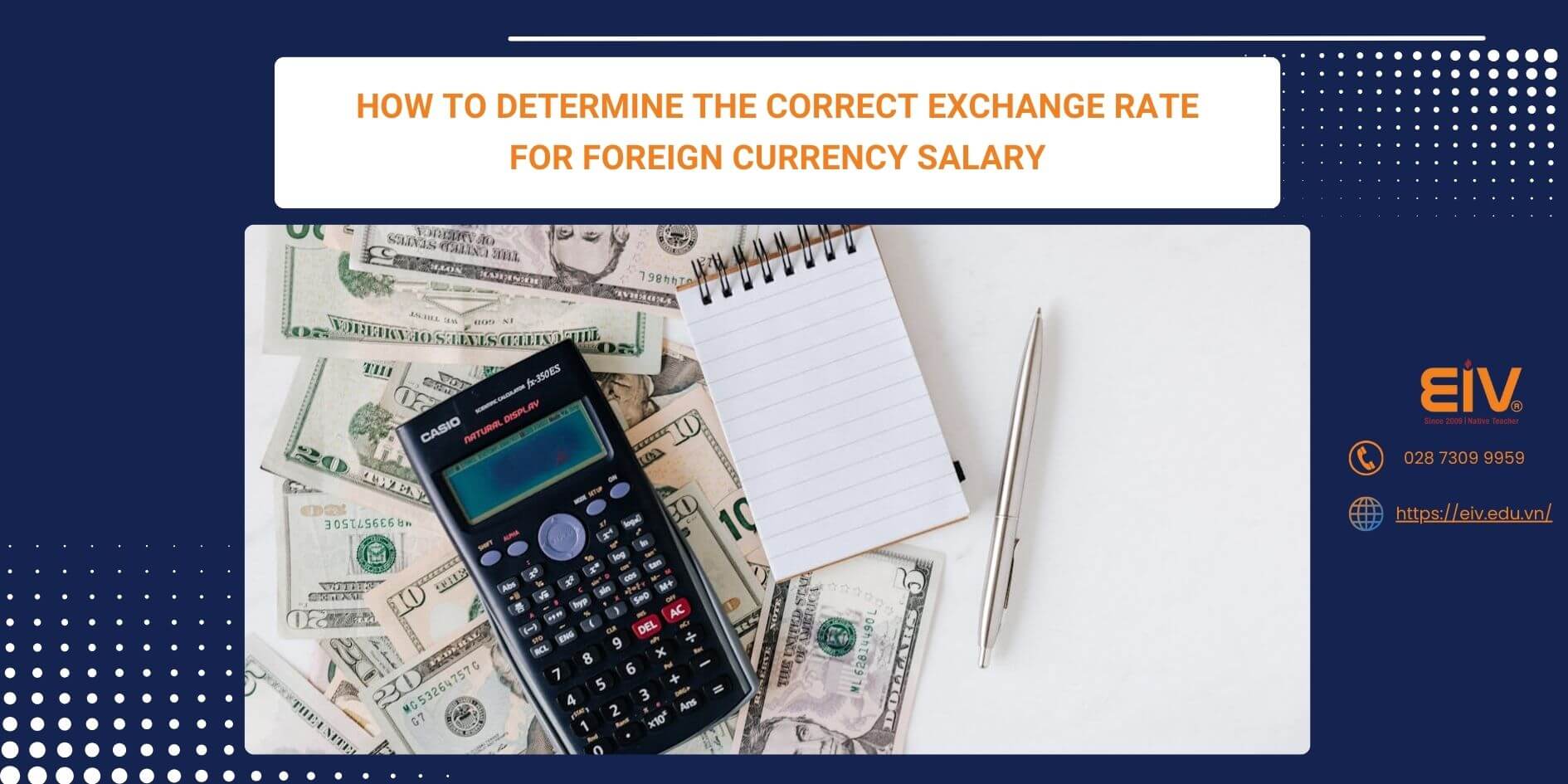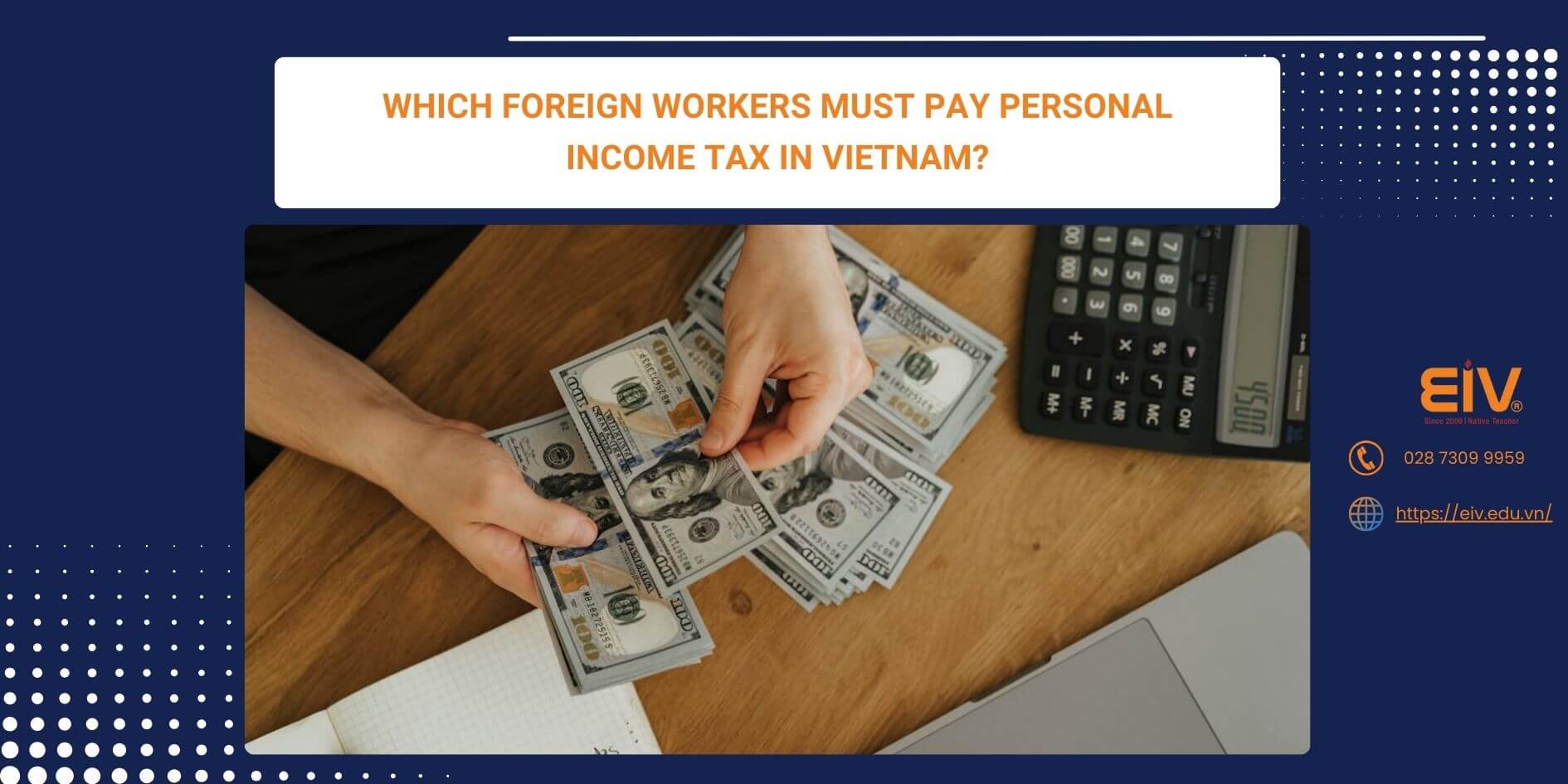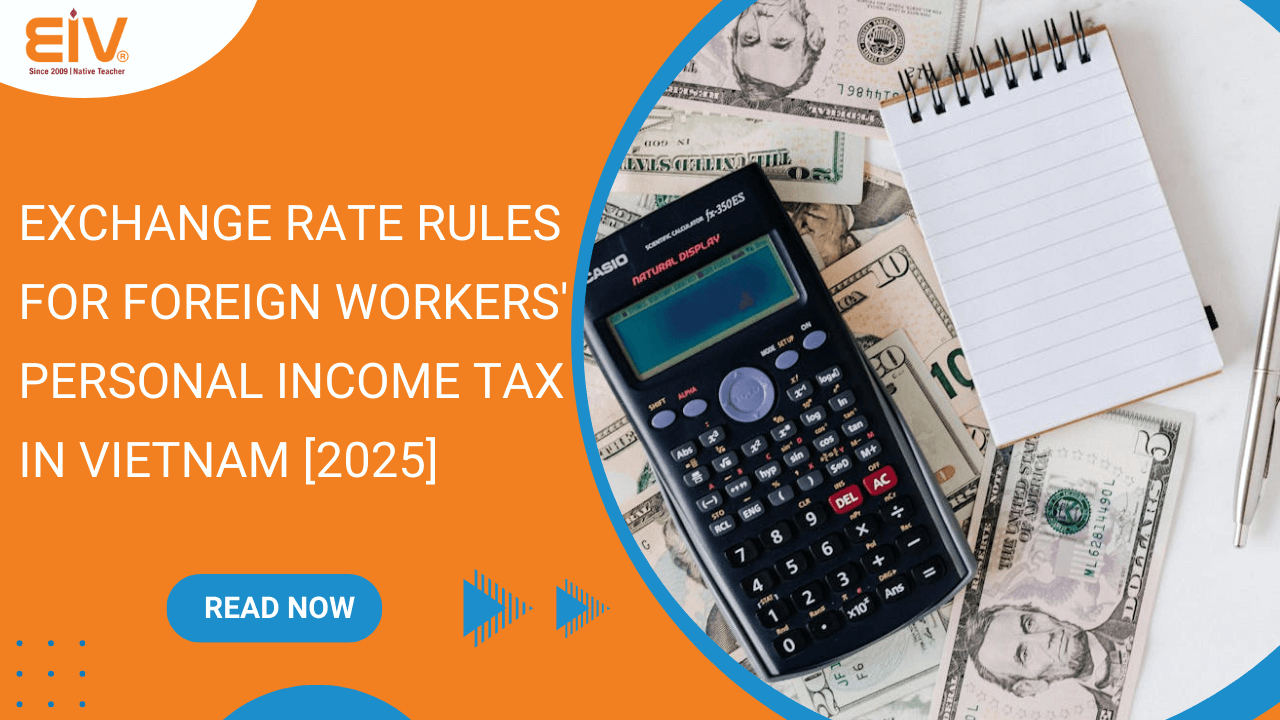Foreign workers receiving salary in foreign currency must convert it to Vietnamese Dong using the actual buying exchange rate of the bank where they hold an account, or Vietcombank’s buying rate if they have no Vietnamese bank account. This requirement is clearly specified in Article 13 of Circular 92/2015/TT-BTC issued by the Ministry of Finance.
The correct exchange rate determination has three critical impacts: direct effect on PIT liability, legal compliance to avoid tax violations, and risk management to prevent penalties and corporate reputation damage. With the complexity of legal regulations and continuous changes, mastering the exchange rate determination process for foreign workers’ personal income tax has become mandatory for all organizations employing foreign staff.
How to Determine the Correct Exchange Rate for Foreign Currency Salary

The exchange rate applied when converting foreign currency salary depends entirely on whether the foreign worker has a bank account in Vietnam. According to Article 13 of Circular 92/2015/TT-BTC, there are two specific cases:
“Revenue and taxable personal income shall be calculated in Vietnamese Dong. In cases where taxable revenue and income are received in foreign currency, they must be converted to Vietnamese Dong at the actual buying transaction rate of the bank where the individual opened a transaction account at the time when the income arose.”
Exchange Rate Application Comparison Table
| Situation | Exchange Rate Applied | Timing | Required Documentation |
|---|---|---|---|
| Has VN Bank Account | Actual buying transaction rate of the bank where account is opened | When income arises | Transaction receipts, bank statements |
| No VN Bank Account | Vietcombank’s foreign currency buying rate | When income arises | Official Vietcombank rate bulletin |
Case 1: Having a Bank Account in Vietnam
When a foreign worker has opened a transaction account at any commercial bank licensed to operate in Vietnam:
Application Principles:
- Rate source: Exact rate from the bank where the account is opened, not from other banks
- Timing: Immediately when salary is received, not at month-end
- Evidence: Foreign currency conversion transaction receipts, account statements showing actual rates
Case 2: No Bank Account in Vietnam
According to Article 13 of Circular 92/2015/TT-BTC: “In cases where taxpayers do not open transaction accounts in Vietnam, foreign currency must be converted to Vietnamese Dong at the foreign currency buying rate of Vietnam Joint Stock Commercial Bank for Foreign Trade at the time when income arose.”
Why Vietcombank is the Standard:
- Most extensive nationwide network
- Transparent and easily accessible exchange rates
- Recognized by tax authorities as calculation basis
Special Regulations:
- For currencies without VND exchange rates: Must convert through intermediate currency with VND rates (usually USD)
- Non-monetary income: Convert according to market price of similar products/services at the time income arose
Complete Personal Income Tax Calculation Guide for Foreign Workers
PIT calculation depends directly on the foreign worker’s residency status, with two distinctly different calculation methods for tax rates and deductions. The process follows a clear 3-step formula that determines your final tax liability.
3-Step PIT Calculation Process
Step 1: Taxable Income (VND)
Taxable Income = Foreign Currency Salary × Exchange Rate
Step 2: Assessable Income
Assessable Income = Taxable Income - Personal Deductions - Other Deductions
Step 3: PIT Liability
- Tax Residents: Assessable Income × Progressive Tax Rates (5%-35%)
- Non-Tax Residents: Taxable Income × 20%
Distinguishing Tax Residents vs Non-Tax Residents
According to Article 2 of the Personal Income Tax Law and guidance in Circular 111/2013/TT-BTC:
Tax Residents: Meet one of two conditions
- Time criteria: Present in Vietnam ≥ 183 days in calendar year or 12 consecutive months
- Residence criteria: Have regular residence in Vietnam according to legal regulations
Non-Tax Residents: Do not meet the above conditions
2026 Personal Deduction Levels
According to Resolution 954/2020/UBTVQH14 of the National Assembly Standing Committee:
| Subject | Monthly Deduction | Annual Deduction |
|---|---|---|
| Taxpayer | VND 11 million | VND 132 million |
| Each Dependent | VND 4.4 million | VND 52.8 million |
Note: Only tax residents are entitled to personal deductions.
Special Formula for Multi-Country Income
For foreign workers working simultaneously in Vietnam and abroad, apply the formula from Article 18 of Circular 111/2013/TT-BTC:
Vietnam Taxable Income = (Days worked in VN / Total working days in year) × Global Income + Other Vietnam-sourced taxable income
Which Foreign Workers Must Pay Personal Income Tax in Vietnam?

All foreign workers with taxable income arising in Vietnamese territory must pay PIT, classified into two main groups: tax residents and non-tax residents. This classification determines the calculation method and benefits received.
Foreign workers must ensure they have proper work authorization before engaging in taxable activities. Recent updates under Decree 219/2025/NĐ-CP: What Are the New Regulations Regarding Foreign Labor Work Permit Issuance? have streamlined the work permit process while maintaining strict compliance requirements for tax obligations.
Types of Taxable Income
Employment Income:
- Basic salary and wages
- Allowances and subsidies of all types
- Bonuses and similar payments
Business Income:
- Profits from production and business activities
- Income from independent professional practice
Investment Income:
- Dividends and profits from capital contributions
- Interest from deposits and bonds
Other Income:
- Real estate and securities transfers
- Lottery winnings, inheritance, gifts of value
Tax-Exempt Categories
According to legal regulations, some categories are exempt from PIT:
- Experts and managers under ODA projects
- Staff of international organizations under signed agreements
- Income below the taxable threshold as regulated
Special Cases in Practical PIT Calculation
Four common special cases require attention: foreign tax credits, exit tax finalization, multiple foreign currencies handling, and situations with missing documentation.
Foreign Tax Credit Deduction
Conditions for application according to Article 26 of Circular 111/2013/TT-BTC:
- Only applies to tax residents
- Must have documentation proving tax paid abroad
- Only implemented during annual tax finalization
Required Documentation:
- Tax authority confirmation from foreign country
- If unavailable: bank document copies + taxpayer commitment
Exit Tax Finalization
According to Circular 92/2015/TT-BTC: “In cases where tax resident individuals who are foreign nationals terminate their work contracts in Vietnam, they must finalize taxes with tax authorities before departure.”
Mandatory deadline: 45 days from departure date
Implementation Process:
- Can be done personally or authorized to company
- Use Form 20/TXN-TNCN for foreign income
- Submit to direct managing tax authority
Handling Multiple Foreign Currency Income
Principle: Convert each foreign currency separately according to corresponding rates at the time income arose. Cannot combine to calculate average rates.
Practical Example March 2026:
- Basic salary: 2,000 USD × 24,500 VND/USD = 49,000,000 VND
- Allowance: 500 EUR × 26,800 VND/EUR = 13,400,000 VND
- Bonus: 50,000 JPY × 165 VND/JPY = 8,250,000 VND
- Total income: 70,650,000 VND
Handling Missing Documentation
Processing principles:
- Apply Vietcombank’s buying rate at the time income arose
- Maintain official rate bulletins from bank website
- Foreign documents must be translated and notarized
Storage period: Minimum 5 years from the following calendar year according to Tax Administration Law.
Before starting work and earning income in Vietnam, foreign workers must complete proper tax registration procedures. For comprehensive guidance on this critical first step, see our detailed Guide to Personal Tax Code Registration for Foreigners in Vietnam which walks through the entire registration process with practical tips and common pitfalls to avoid.
Common Mistakes and Risk Prevention
The most common mistake in determining exchange rates for PIT calculation is confusion about timing and standard rate sources. These errors can lead to regulatory violations and penalties.
Common Mistakes and Prevention
Regarding Exchange Rate Timing:
- Correct: Use exchange rate at the time income arose (when salary received)
- Wrong: Using month-end rates or tax withholding timing
- Prevention: Record exact salary receipt date and that day’s exchange rate
Regarding Rate Sources:
- Correct: If having VN bank account → use that bank’s rate
- Correct: If no account → use Vietcombank rate
- Wrong: Always using buying rates, not selling rates
Regarding Residency Status:
- Monitor days present in Vietnam closely
- Count both arrival and departure days
- Update residency status changes promptly
Applying correct exchange rate conversion according to legal regulations is not only a mandatory obligation but also a crucial factor ensuring legal compliance and avoiding tax risks for both enterprises and individuals.
The regulations on exchange rates for foreign workers’ PIT calculation continue to be updated to match economic reality. Enterprises and individuals need to proactively monitor new circular guidance, especially changes related to digital technology and electronic transactions in tax management.
Frequently Asked Questions

Q: What exchange rate applies for foreign workers working under 183 days receiving USD salary through Vietnamese banks?
- A: Apply the actual buying transaction rate of the bank where the account is opened at the time income arose. Working under 183 days only affects residency status (non-resident with 20% tax rate) but doesn’t change the exchange rate determination principle according to Article 13 of Circular 92/2015/TT-BTC.
Q: Can I choose the most favorable exchange rate when rates fluctuate strongly during the month?
- A: No. You must strictly apply the exchange rate at the specific time income arose according to legal regulations. Arbitrarily choosing exchange rates is considered a tax violation and may result in penalties.
Q: How to calculate tax when receiving salary in multiple foreign currencies (USD, EUR, JPY)?
- A: Convert each foreign currency separately according to corresponding rates at the time income arose, then sum total VND income to calculate tax. Cannot combine different foreign currencies or use a common average rate for all.
Q: If I already paid PIT abroad, can it be deducted from tax payable in Vietnam?
- A: Yes, but only applies to tax residents and only implemented during annual tax finalization. Must have complete documentation from foreign tax authorities or bank documents proving tax payment. Deduction doesn’t apply to non-residents.
Q: What’s different about Circular 92/2015/TT-BTC compared to previous regulations?
- A: More specific and clear regulations about determining exchange rates based on having Vietnamese bank accounts or not. Previously, regulations were vague about standard rate sources. Circular 92/2015 clarified: if having account use bank account rate, if no account use Vietcombank rate.
Q: Must foreign workers finalize taxes when departing Vietnam?
- A: Yes, foreign tax residents terminating work contracts must finalize taxes within 45 days from departure date. Can authorize companies or income-paying organizations to do it on their behalf. Non-residents don’t need finalization but only need monthly/quarterly tax declarations as regulated.





 Hồ Chí Minh: 028 7309 9959 (Phím 1)
Hồ Chí Minh: 028 7309 9959 (Phím 1)
